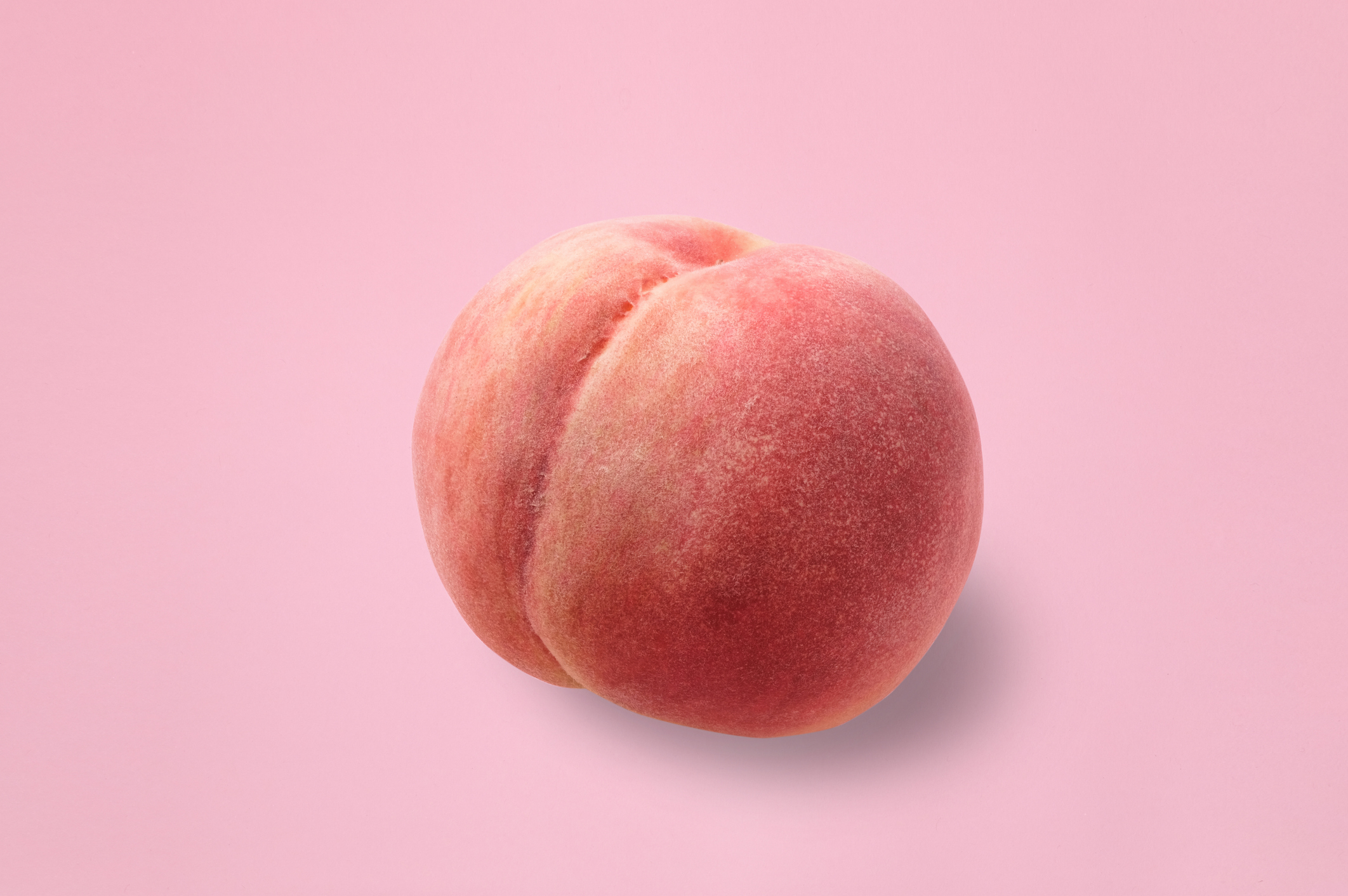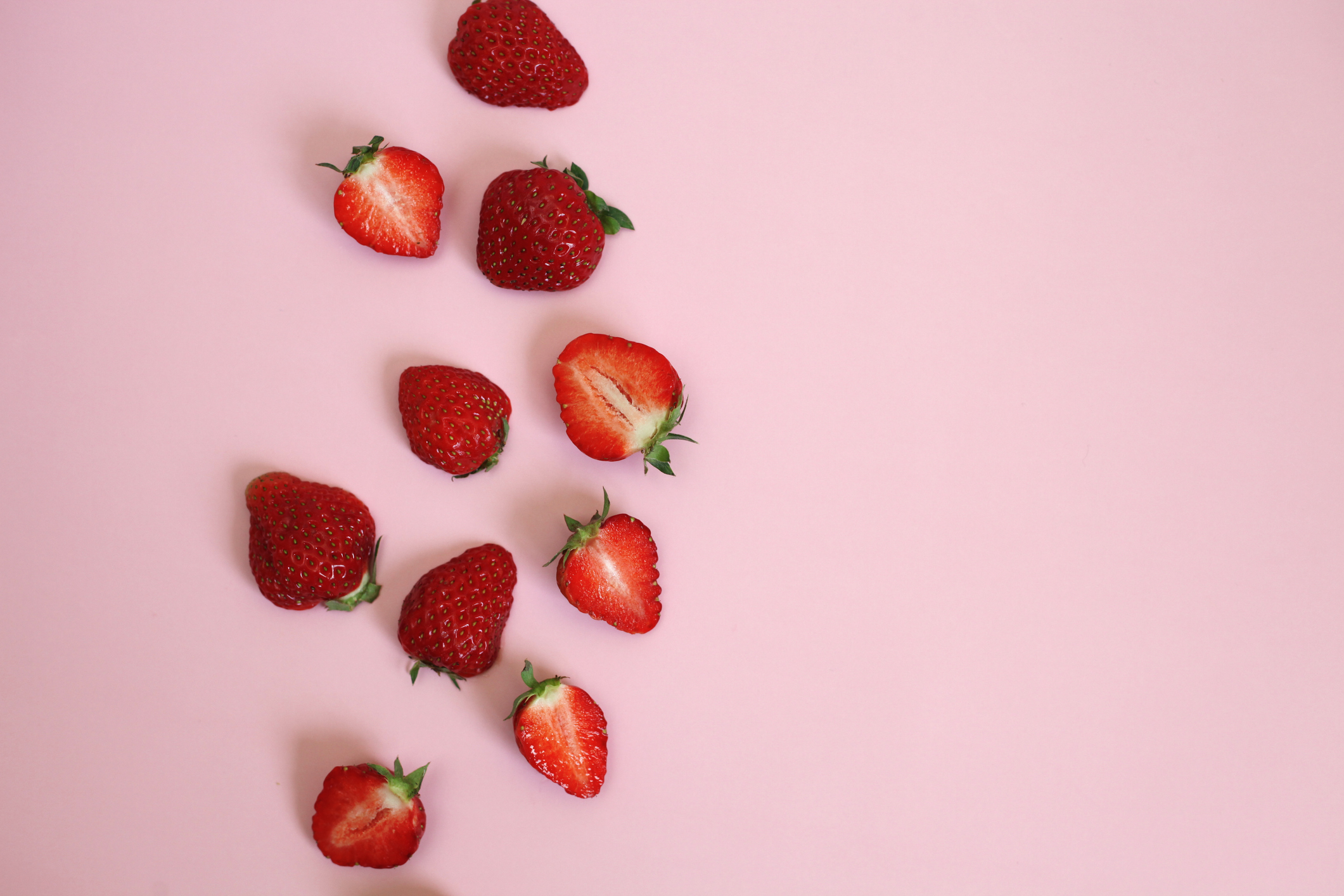Are you making a tiny human? Perhaps your little one is already here and you’re in the throws of sleepless nights and wondering if your baby is fed/happy/warm/cool enough.
It’s safe to say, pregnancy and postpartum are incredibly demanding times, both physically and mentally.
While pregnant, nutrition can take a bit of a backseat. Between morning sickness, cravings, and food aversions it may not be possible to nourish yourself as you usually would. Aversions to meat and vegetables are commonly experienced while nausea and cravings mean a box of crackers is always within reach. And it doesn’t stop there. During the postpartum period, it’s normal to lack time/energy/motivation to fuel yourself (and who’s to blame you).
Despite that, during these periods, proper nourishment is important. Not only for your growing little one, but for yourself too. Nourishing yourself adequately will help you feel more energised, improve your mood and helps to hold off dipping into your fuel and vitamin reserves.
Today we dive into pregnancy and postpartum nutrition. Sara Widdowson (from @yourmonthly) shares her expert knowledge on nutrition during the Fourth Trimester – something she is currently experiencing with her little boy Toby. We also chat about how Pro You Pea and Whey Protein Blends can be a safe and effective nutritional supplement during pregnancy and those tough postpartum months. And lastly, Hannah, mama to her 4-month son Luca, shares her top nourishment tips and three go-to recipes.
Women’s health dietician, Sara Widdowson on Fourth Trimester Nutrition
Your nutrition requirements during the fourth trimester are unique and very different to pregnancy. Your iron levels may have been depleted in pregnancy and childbirth, you may require additional fiber to help promote good digestion for pelvic floor recovery and will certainly need an increase in calorie and fluid intake to support breast feeding if this is how you are feeding your little one. There is also some evidence that postpartum nutrition plays a role in preventing or reducing your risk of mental health complications after birth.

Sara Widdowson is a dietitian and nutritionist at Oxford Women’s Health in Christchurch, New Zealand.
Below is some information you may find helpful when considering how nutrition can support your journey into motherhood.
Key nutrients in the fourth trimester:
- Calories
Your energy needs for breastfeeding are higher than what you required in pregnancy. You will need approximately 500 to 600 kcals (calories) per baby, each day. This is on top of the amount you would eat before you were pregnant. Increasing your snack intake can help you to meet not only your energy but also nutrient requirements. A slice of whole grain toast with peanut butter and banana, Greek yogurt and a handful of muesli, avocado and crackers or fresh fruit and nuts are all great snack examples.
- Iodine
Iodine is an essential nutrient required in small amounts to support normal growth and brain development in babies but also has an important role in thyroid function for mothers. Women are encouraged to continue to take iodine supplementation while breastfeeding and if your baby is formula fed then iodine is provided in infant formula. Iodine rich foods shouldn’t replace supplementation in the fourth trimester but include seafood, seaweed and iodized salt used in cooking.
- Iron
Up to 25% of mothers experience iron deficiency in pregnancy and some also encounter issues with low iron levels after delivery. Iron is attached to red blood cells in the body and is responsible for carrying oxygen to our cells. Many people know that low iron leads to fatigue but it also has a role in our mood, both of which are crucial in the fourth trimester. Focus on including iron rich foods in your diet from a variety of sources. The iron found in red meat is much more readily absorbed by the body but iron is also found in other sources such as eggs, chicken, dark leafy green vegetables, nuts and seeds, some dried fruits, legumes and pulses and wholegrains such as oats.
- Protein
Protein is used by the body for cell repair and healing. It also helps us to feel full and satisfied and helps with blood sugar regulation which may help you combat some of that new born fatigue! Protein containing foods are often more time consuming to prepare meaning many new mums are not getting enough. Tinned fish, hummus, boiled eggs, yogurt and protein powder added to smoothies or oats are all quick easy ideas.
- Vitamin D
Vitamin D is unique as we cannot meet our requirements from diet alone but rather we make this vitamin when exposed to sunlight. Research suggests that 30-40% women of reproductive age are deficient in Vitamin D and your needs are higher during pregnancy and breastfeeding. We understand that Vitamin D has a role in our mood and mental wellbeing and is also used by the body to absorb calcium from food. Aim for some sunlight exposure each day by taking a walk when you can or eating lunch outside. Speak to your LMC, GP or Dietitian if you think you could benefit from a supplement.
- Calcium
After pregnancy, your calcium stores need to be replenished (whether you are breastfeeding or not) The best sources of calcium are dairy foods, especially those that have been calcium enriched, tinned fish with edible bones such as canned salmon, soy milk and tofu, nuts and seeds and dark leafy green vegetables.
Top tips:
Plan and prepare ahead of time if you can! Have a few meals ready to pull out of the freezer and you can even make snacks such as bliss balls or bran and berry muffins to freeze for when you need them. Have snacks and a water bottle near where you plan to feed your baby such as the nursery chair.
Aim for nutrient dense as well as convenient foods. It is all too easy to grab biscuits, chocolate or chips when we are hungry and tired but try and pick foods that have nutrients as well as the calories such as dried fruits, nuts, yogurt or cheese and whole grain crackers.
Protein intake recommendations while pregnant and breastfeeding
If you’re pregnant or lactating, the recommended daily intake (RDI) for most nutrients (along with your overall calorie requirements) increases. For example, the RDI for protein for non-pregnant, non-lactating women is around 0.8 grams per kg. This number depends on factors like age, build, and activity level. For pregnant women, this increases to roughly 1.1 grams per kg. And for those breastfeeding, this grows further to 1.3 grams per kg plus 20 grams more. So, if you can’t stomach meat (or even the smell of it) in your first trimester – what do you do? Firstly, experiment with an alternative form of protein that you can enjoy and keep down – greek yoghurt, cottage cheese, fish and protein powder are all great options. And secondly, don’t be too hard on yourself – if you’re surviving off boxes of Arnott’s Shapes – you’re not the only one.
Safe supplementing with protein powder while pregnant and breastfeeding
Supplementing protein powder is a great way to top up your nutrients during pregnancy and postpartum. Of course, the number one priority is to keep you and your baby safe. While Pro You Whey and Pea Protein Blends are safe to take while pregnant and breastfeeding, you should check with a health professional beforehand. It’s always best to check with your GP/LMC/Ob-gyn before starting any drug or supplement (even herbal supplements) while pregnant or breastfeeding. They can look at your situation holistically and determine whether any interactions or interferences may occur. And remember, there are no silly questions. If you need any more information on our products and their suitability, message us at [email protected]. We would love to hear from you!
Quick and easy high-protein meals with Pro You Protein Blends

Hannah, our content writer and new mama, has shared 3 of her go-to postpartum meals.
“When you don’t have the time nor energy to make a meal – these meals are seriously quick and packed with nourishment while still tasting delicious. Honestly speaking, these recipes aren’t flamboyant or even beautiful – they simply do the trick by using minimal ingredients and time. Sub-out and sub-in ingredients as necessary and don’t feel like you have to go out and buy special ingredients. One last trick is to add a scoop of protein powder to oatmeal or yoghurt. It’s the quickest nutrient bomb that will keep you full and boost your energy levels. It also makes them super thick and creamy!”
Protein Overnight Oatmeal
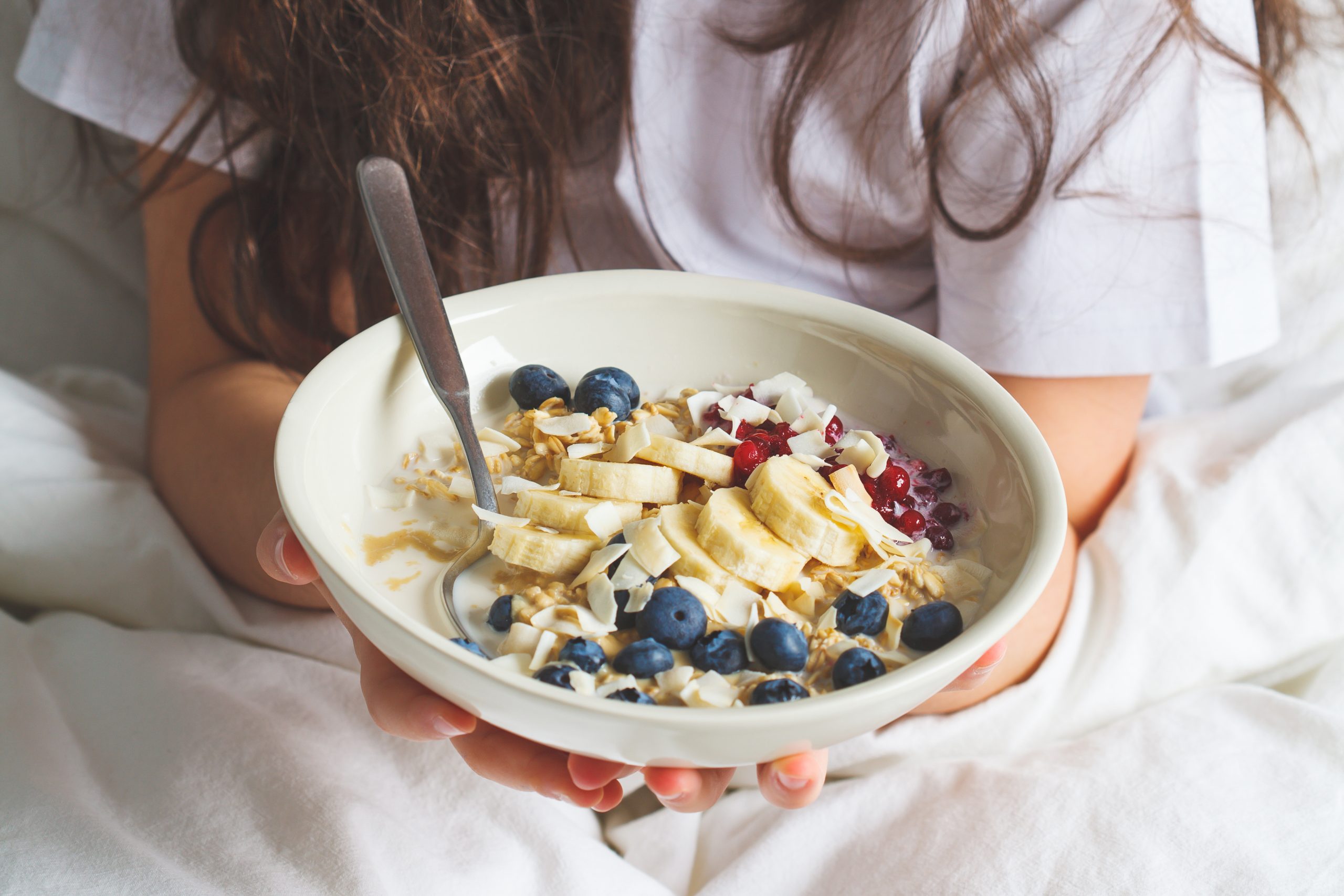
Overnight oatmeal with berries, banana, Pro You Pea or Whey Protein Powder and coconut.
I ate this religiously during my Fourth Trimester. In those early months, having breakfast was a non-negotiable. Preparing it the night before meant when morning came and I was bleary eyed – breakfast was ready. It also didn’t matter if I had to leave it midway through as, unlike oatmeal, it doesn’t go cold (unlike my many abondoned cups of tea).
It’s a simple mix of oats (for fibre and naturally increases milk supply), yoghurt (for gut health and protein), Pro You Protein Blend (for vitamins and protein), nuts (for healthy fats and appetite satiation) and frozen berries (a convenient source of antioxidants).
Ingredients:
1/2 cup of plain rolled oats
1 cup of greek yoghurt
1 serving of Pro You Pea or Whey Protein Powder
1/4 cup of frozen berries (raspberries are great)
Toasted nuts – any you like (e.g. almonds, walnuts, hazelnuts)
Method:
Mix oats, yoghurt, and protein powder in a bowl or jar. Top with raspberries and nuts. Done!
It’ll thicken up overnight, but if you prefer it looser, add water or milk. You can add anything else you fancy – ground linseeds, chia seeds, banana, nut butter are all excellent.
Banana Nut Protein Smoothie
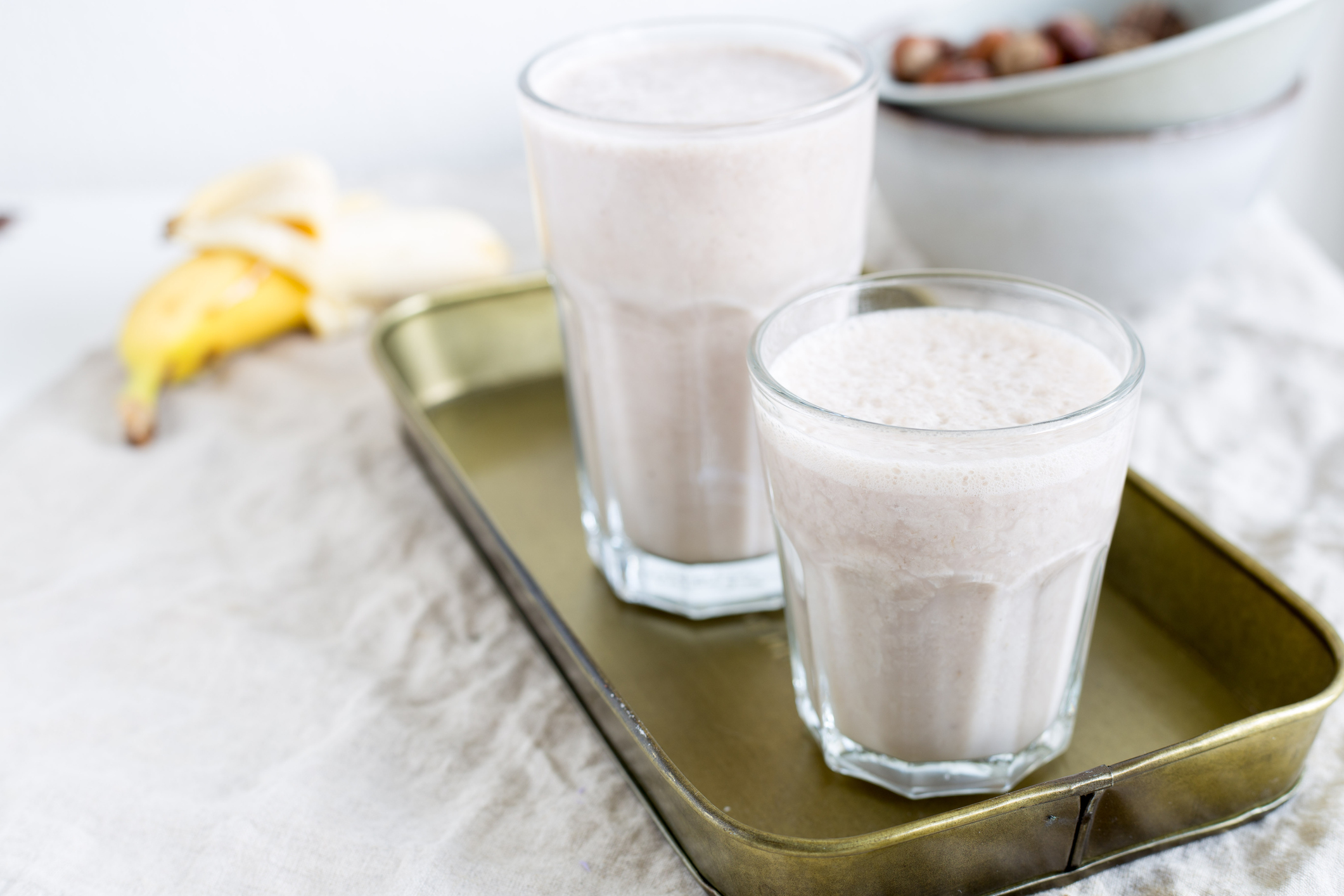
Banana smoothie with Pro You Pea or Whey Protein Powder.
Sometimes less is more. And this smoothie recipe is case and point. Feel free to load it with more – but thanks to the 13 vitamins and minerals in Pro You Protein Blends, you can keep it minimal while not missing out on essential nutrients. I find the Protein Blend adds just enough sweetness that no extra sweetener is needed. Want to boost your milk production? Add 1/4 – 1/2 cup of raw oats.
Ingredients:
1 frozen banana, broken in half
1 serving of Pea or Whey Pro You Protein Blend
1 tsp cinnamon
1 tbsp nut butter
Water
Method:
Blend until smooth – simple as that.
Protein Lactation Bites/Cookies
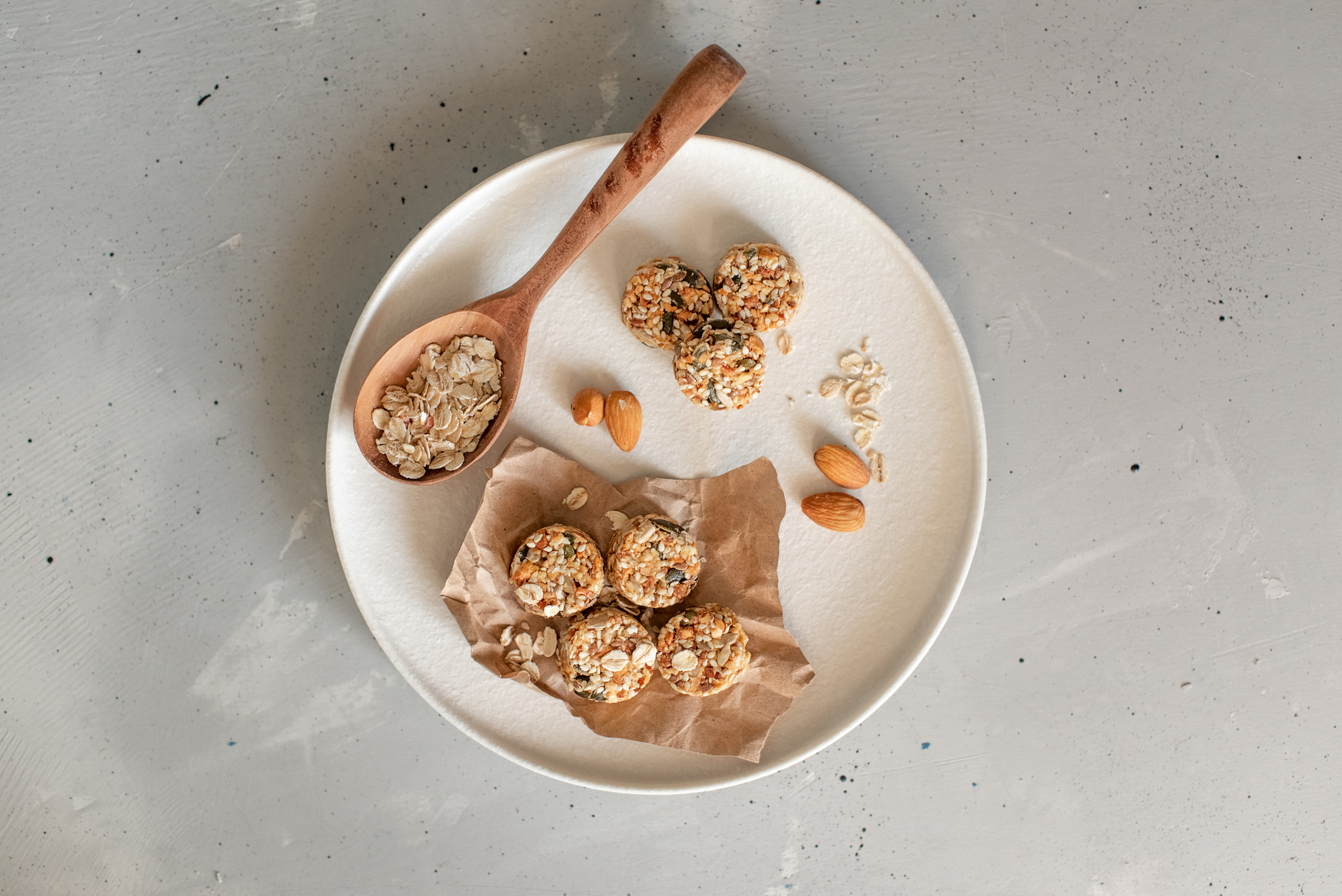
Lactation cookies with Pro You Pea or Whey Protein Powder, brewers yeast, nuts and seeds.
Lactation cookies contain galactagogues – foods thought to stimulate milk production. I found these cookies handy when I was out-of-the-blue ravenous (admittedly, most of the time). I’d be lying if I said I had time to preheat an oven and bake them – so these are non-bake – simply mix and roll. No burning guaranteed!
Ingredients:
4 tbsp Pro You Vanilla Pea or Whey Protein Blend
1/2 cup nut butter
3/4 cup plain rolled oats
3 tbsp ground linseeds
3 tbsp brewers yeast
2 tbsp pumpkin seeds (or any mix of seeds you have on hand)
1/3 cup of sweetener (e.g. rice malt syrup, honey, maple syrup)
1/4 cup of desiccated coconut
Method:
Mix all ingredients in a bowl until it’s sticky enough to roll into balls – add more peanut butter if it seems too dry or more protein powder and oats if it’s too wet. Store in the fridge and nibble (or in my case, gobble) as needed!



